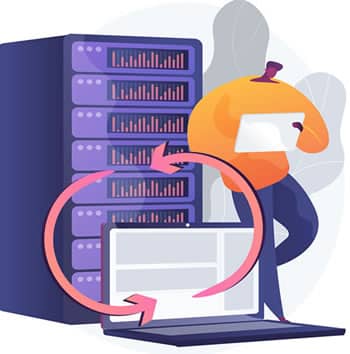7 ways to prevent data loss from a Company

Introduction
Data loss is a serious problem for businesses. It can cause great financial losses and damage your reputation. But with the right steps, you can prevent data loss in your company by preventing malware, viruses and Trojans from taking over computers and networks.
1. Use updated software
It’s important to keep your software up-to-date. The latest versions of the programs you use in your business can prevent data loss, like a virus that damages files or deletes them from your computer.
If you don’t update your software regularly, it could lead to problems like:
- A vulnerability in one of the programs being exploited by hackers; this means that any other person who has access to this same program could exploit it and cause damage similar to what happened with Equifax (which had its own security breach).
2. Back up your data
Backing up your data is the most important thing you can do to prevent data loss. It’s not just about protecting yourself against a hard drive failure or theft, but also keeping in mind that your company could go under at any time. You don’t want to be left with only partial backups of all your files, which could mean losing hours worth of work because you didn’t know what happened until it was too late.
There are two ways you can back up your files: online and offline (USB). Online backups allow you to store them somewhere safe where they’ll stay accessible even if there’s an internet outage or power failure—it’s like having an extra copy on hand wherever you are! Offline backups are more convenient because they’re stored locally on a hard drive instead of being uploaded somewhere else (which makes them much safer), so if something happens like someone steals all your computers/laptops/etc., then at least those files won’t be lost forever either!
The best way to make sure that these methods work together effectively is through proper planning ahead.”
3. Keep your antivirus up-to-date
Antivirus software is a must for all computers, and it’s important to keep your antivirus software up-to-date.
Why? Because malware can sneak into your system without you knowing it. If you don’t have the correct protection in place, hackers could easily infect your device with malicious software that will steal sensitive data or cause other problems on the computer.
If you have an older version of Windows 10, make sure to update it at least once every year by going through Settings > Update & Security > Check for updates (or use this link). If possible, do so weekly if possible so that any new threats aren’t missed along with their updates!
4. Create a firewall
A firewall is a barrier that prevents unauthorized access to a computer or network. Firewalls can be software or hardware, and they can be either network-based or host-based. They’re used to protect your computer from viruses and other malware by blocking unauthorized traffic before it reaches your machine.
Firewalls are an important part of any company’s security setup because they prevent intruders from gaining access to sensitive information on the network without authorization from authorized users who have been granted access rights through explicit grants of authority by management.
5. Don’t click on suspicious links or emails
- Don’t click on suspicious links or emails.
- Don’t open attachments from people you don’t know.
- If you’re unsure about the source of an email, don’t open it unless it’s from someone who is known to you and in your network of contacts.
6. Use a VPN
A VPN, or virtual private network, is a technology that allows you to connect to the internet through an encrypted tunnel. The end result is that all of your data passes through this secure connection and cannot be intercepted by anyone who might want access to it.
Benefits of using a VPN include:
- Protection against hackers and other cybercriminals who may attempt to steal information from your company’s network
- Security for sensitive materials such as financial data or customer records
7. Stay safe on PDAs and mobile phones
It’s important to be aware of the risks that come with using a PDA or mobile phone. The most common way you can lose data is by leaving your device unattended, but there are other ways too.
For example:
- Don’t give out personal information. If you do this and lose your device, you could be liable for any damages caused by someone who has gained access to that information (even if they’re not working for your company).
- Don’t use public wifi connections—they may not be secure enough for sensitive data like passwords or credit card numbers!
Conclusion
Data is the lifeblood of any business, and it’s important to protect that data. In fact, in many companies, having security procedures in place is mandatory. However, there are times when even the best-designed systems fail miserably—and as we talked about earlier, losing so much as a single document can have serious consequences for your company’s operations. The good news is that there are professional data recovery companies in kenya such as East Africa Hi Tech Solutions that can help in data recovery services.
